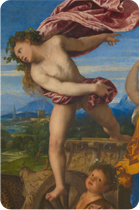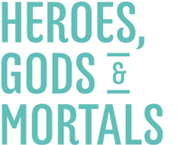 |
Tuesday & Wednesday, May 12 & 13, 8pm |
Programme notes
by Andrea Budgey
The gods and semi-divine heroes of classical Greek and Roman mythology have remained central figures in Western narrative over the centuries. Perhaps this is because of the cosmic implications of their actions. Or perhaps it is because of the very human qualities of their interactions, which so readily lend themselves to treatment in a variety of styles – serious, personal, comic, and satirical.
The figures represented in this programme include divinities like Aphrodite/Venus (or her statue), Zeus, and his daughters the Muses, patrons of the arts; semi-divine heroes like Hercules and Orpheus, and mere mortals whose lives intersect with the whims and desires of the gods, like Leda and the inadvertent consort of Venus. The literary genres are diverse: Sappho's apostrophe to Aphrodite from the 6th century BC, a mythical explanation of geological phenomena, a reimagining of the Muses on Spanish soil, poetic reflections on encounters with the divine (both sensual and tragic), and satire on 20th-century American life.
Many ages have passed since the gods of the Greco-Roman pantheon were objects of religious veneration. Still, they will clearly continue to act as powerful points of attachment for human emotion and reflection, and as inspiration for art in all its forms.
Alan Hovhaness: Hercules. Text by the composer
John Plant: Invocation to Aphrodite. Poem by Sappho
Joaquín Turina: Las Musas de Andalucía (excerpts). Various texts
Monica Pearce: Leda Songs. Poems by Rilke, HD, and D.H. Lawrence
Giovanni Battista Pergolesi: Orfeo. Text by the composer.
Kurt Weill, arr. Laura Jones: Songs from One Touch of Venus. Lyrics by Ogden Nash
Alan Hovhaness (1911-2000): Hercules (1959) for soprano and violin. Text by the composer
American composer Alan Hovhaness was inspired not only by his own Armenian heritage, but also by a broad range of the world's traditional musical cultures, especially that of India. He once articulated his vision for integrating these influences:
I propose to create a heroic, monumental style of composition simple enough to inspire all people, completely free from fads, artificial mannerisms and false sophistications, direct, forceful, sincere, always original but never unnatural.
The theme of Hercules is the separation of heaven, earth, and hell. The piece alternates declamatory accompanied sections with passages of dialogue between the solo voice and violin. It was composed in India after a visit to the Aegean islands. Hovhaness described his own text as "in the style of Indian myths or fairy-tales", but the musical influences he acknowledges are more diverse:
The sounds of sliding tones and long melodic lines evoke feelings of ancient Shamanistic rituals, of pre-Christian, Armenian, or Greek civilizations. Both voice and violin imitate cries of nature and primeval sounds. … A feeling of wildness pervades the music. …
John Plant (1945-): Invocation to Aphrodite (1995) for mezzo-soprano, string quartet and piano. Poem by Sappho
Originally from New York, John Plant has been resident in Canada since 1968, and a Canadian citizen since 1973. He studied composition with Bruce Mather and Charles Palmer at McGill University. He has also pursued intensive studies in classics, language, and literature (before emigrating he was a Woodrow Wilson Fellow in comparative literature at Harvard) and his musical works reflect this passionate interest in language and the human voice.
Invocation to Aphrodite is a setting of the only substantial piece by the ancient Greek poet Sappho to survive in its complete form. Sappho, greatest of the Greek lyric poets, lived on the island of Lesbos where she seems to have attracted a circle of female disciples dedicated to the arts. The composer says,
I have tried to capture something of the subtle texture of sound, rhythm, and image in this poem, written in the delicately irresistible Sapphic metre; I also hope to convey Sappho's sense of a shimmering, many-layered reality, and thus to pay homage to the presence and richness of Aphrodite in our own lives.
The
alternating and often irregular metres, and the chromatically-inflected
modal figures of the vocal line, allude to the style of the handful of
notated Greek songs which survives from classical antiquity; but the
richly complex textures of the instrumental writing locate the work
firmly in our own time.
Joaquín Turina (1882-1949): excerpts from Las Musas de Andalucía (1944) for soprano, string quartet and piano. Various texts
Born in Seville, and trained in Madrid and Paris, Joaquín Turina was a prominent representative of the Spanish nationalist school of composition in the early 20th century, whose works include orchestral, chamber, and piano music, as well as a number of songs. He had a particular interest in the traditions of his native Andalucía. When he introduced Las Musas de Andalucía on Spanish national radio at the première broadcast, he remarked on the apparent "strangeness" of clothing the classical Muses in Andalusian costume, but claimed as his inspiration the use of classical imagery in the writing of Benito Pérez Galdós and the architectural decoration of Francisco Goya.
Melpomene, the Muse of tragedy, is represented by a setting for voice and piano of a poem by Josefina de Attard y Tello, also known as Fina de Calderón. The song is initially in a fluid triple metre, but changes at the midpoint to an energetic tiempo de marcha. It is marked by a sensuous chromaticism, which Turina uses both structurally and decoratively.
Next
on this evening's programme is Erato, the Muse of lyric poetry, in
which dramatic utterances by the string quartet, full of portentous tremolos,
alternate with limpid and delicately ornamented solo vocal melodies.
The final movement is Caliope, Music of epic poetry, described by
Turina as an anthem (himno) for piano and string quartet.
Monica Pearce (1984- ): Leda Songs (2015) for mezzo-soprano, clarinet and string trio. Poems by Rilke, HD and D.H. Lawrence
Toronto-based composer Monica Pearce has had works performed by Array Ensemble, eklektikos ensemble, TorQ percussion quartet, junctQín keyboard collective, Sneak Peek Orchestra, Tonus Vivus Ensemble, Avant Guitars, Digital Prowess, and Tandem Percussion. She is also co-founder and artistic director of the Toy Piano Composers. In this newly commissioned piece for the Talisker Players, she has drawn together three poems on the encounter between the Spartan queen Leda and the god Zeus, in the form of a swan. Pearce remarks,
The interpretation of this myth in art is multifaceted, with some works quite aggressive, many sensual and erotic, and some romantic. While they are quite different in style, the poems I chose, – three different authors' takes on the myth – share a similar sensibility…as if [Leda] is a willing participant in the transformation and sensuality of the experience.
In
all three movements, the singer presents Leda's viewpoint, while the
clarinet and bass clarinet represent Zeus. In the first, a dramatic
text by Rilke, the counterpoint of the protagonists is given an urgent
forward movement by the accompaniment of the strings. The second, the
lyric by HD (Hilda Doolittle), is given fleeting interjections from the
individual string lines, alongside the convergence of the voice and
clarinet. The final movement, a spare and delicate setting of a D.H.
Lawrence poem, includes rhythmic key-clicking by the clarinet, which
seems to underline the swan/god's animal nature. As Pearce describes
it, the whole piece is "a textural and rhythmic decrescendo, from the energy of the Rilke to the calmness of HD, to the sweet tenderness of D.H. Lawrence".
Giovanni Battista Pergolesi (1710-1736): Orfeo, for soprano, strings and continuo. Text by the composer
Orfeo was Pergolesi's last work in the cantata genre, and appears to have been extremely popular during the 18th century. The first edition with a printed date comes from 1738, and many other editions and contemporary copies have survived.
The
libretto begins with the moment of Orpheus's entry into the underworld
in search of his wife Euridice. The first recitative is a third-person
narration, announcing the hero's arrival into "the forbidden kingdom,
where all light must perish". The two arias and compact intervening
recitative which follow portray Orfeo's own grief, his highly
rhetorical plea to the "pallid shades" of Hades, and his resolve never
to be separated from Euridice again. Both arias are in ABA form. In the
first, marked amoroso, the first violin part alternately
supports and comments on the vocal line, as if reinforcing the hero`s
lamentation, while a gently undulating figure appears and reappears in
the second violin. The final aria, marked presto, is more
economical in texture: the first violin part often doubles the vocal
line, and occasionally all the strings resort to unison figuration,
echoing, perhaps, the single-mindedness of Orfeo's devotion. Despite
the famously tragic ending of Orfeo's story, the cantata ends on a note
of brisk resolution.
Kurt Weill (1900-1950): Songs from One Touch of Venus, arr. for mezzo soprano and string quartet by Laura Jones. Lyrics by Ogden Nash
When Kurt Weill left Europe in 1935, he more or less abandoned the aesthetic of rigorous social criticism which had informed his collaborations with such playwrights as Bertold Brecht and Georg Kaiser, and embraced instead the populist appeal – and commercial constraints – of the Broadway musical. What he retained from his earlier work, however, was his highly cultivated approach to theatrical forms and the development of character.
One Touch of Venus, a musical with lyrics by Ogden Nash, and book by Nash and S. J. Perelman, opened in October of 1943 and ran for 567 performances. Despite its broad comedy, it shares with Weill's European theatre works a vividly satirical approach to social values and customs. It tells the story of a shy barber who falls in love with a miraculously animated statue of Venus, and the complications which arise – both from the goddess's dread of the tedium of suburban life, and from her decidedly mortal lover's pre-existing engagement. This scenario allows for ironic and bittersweet comment on relations between the sexes in mid-20th-century America, presented in the relaxed and syncopated language of popular musical forms.
In Laura Jones' arrangement, the string quartet fulfills the task of the theatre orchestra, while the clarinet (and bass clarinet) punctuate the vocal line, sometimes with offhand comments and sometimes with sympathetic agreement. It is worth noting that Marlene Dietrich, originally booked to play the role of Venus, decided that it was "too sexy and profane", and withdrew from the production during rehearsals.
 |
 |
